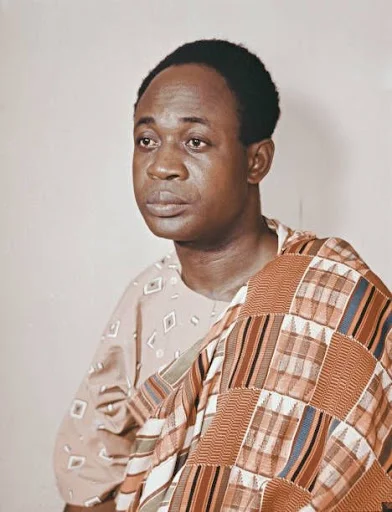Dr.-Kwame-Nkrumah:-Champion-of-National-Unity-and-Sovereignty
Dr. Kwame Nkrumah: Champion of National Unity and Sovereignty
Dave Ikiedei Asei
09/05/2024
Introduction
Dr. Kwame Nkrumah, the visionary leader of Ghana's independence movement, stands as an exemplar of unwavering dedication to the principles of national unity and sovereignty. His tireless efforts in decolonization and fostering unity among Ghanaians and Africans at large serve as invaluable lessons for generations to come. This article deals with the life, legacy, and lessons of Dr. Kwame Nkrumah, highlighting his pivotal role in shaping Ghana's destiny and his enduring impact on the African continent.
Early Life and Education
Born on September 21, 1909, in Nkroful, Gold Coast (now Ghana), Kwame Nkrumah was exposed to the injustices of colonial rule from a young age. His education, initially at the hands of missionaries, exposed him to Western ideals of democracy and freedom, igniting in him a fervent desire for self-determination and sovereignty for his people.
Nkrumah's intellectual journey took him to the United States, where he pursued higher education at Lincoln University and the University of Pennsylvania, earning degrees in theology and education, respectively. It was during his time in the U.S. that he was exposed to the burgeoning civil rights movement, which further fueled his passion for social justice and liberation.
The Path to Independence
Upon his return to the Gold Coast in 1947, Nkrumah immersed himself in the nationalist movement, galvanizing support for Ghana's independence from British colonial rule. His charismatic leadership and unwavering commitment to the cause propelled him to the forefront of the struggle, earning him the moniker "Osagyefo," meaning "redeemer" or "savior."
In 1957, Ghana became the first sub-Saharan African nation to gain independence, with Nkrumah at its helm as Prime Minister. His famous declaration, "The independence of Ghana is meaningless unless it is linked up with the total liberation of Africa," underscored his belief in pan-Africanism and the interconnectedness of the continent's struggles against colonialism and imperialism.
Promotion of National Unity
Central to Nkrumah's vision for Ghana was the promotion of national unity and cohesion among its diverse ethnic and cultural groups. He recognized that the legacy of colonialism had left deep divisions within Ghanaian society, and he sought to overcome these through policies aimed at fostering inclusivity and solidarity.
Nkrumah's government implemented measures to promote national identity and pride, including the adoption of a new flag and national anthem. He also invested heavily in education and infrastructure, aiming to uplift the standard of living for all Ghanaians regardless of their background.
Furthermore, Nkrumah championed the concept of "African Personality," asserting that Africans should embrace their heritage and cultural identity as they charted their own course towards progress and development. This emphasis on self-reliance and self-determination resonated deeply with many Africans across the continent, inspiring similar movements for independence and unity.
Challenges and Controversies
Despite his noble intentions and achievements, Nkrumah's tenure as Ghana's leader was not without challenges and controversies. Economic mismanagement, political repression, and growing authoritarianism marred his later years in power, leading to internal dissent and external criticism.
Nkrumah's ambitious development projects, such as the Akosombo Dam and the Volta River Authority, faced criticism for their cost and feasibility, straining Ghana's economy and exacerbating its dependence on foreign aid. Moreover, his administration's suppression of political opposition and curtailment of civil liberties drew condemnation from human rights organizations and foreign governments alike.
Legacy and Lessons
Nevertheless, Dr. Kwame Nkrumah's legacy as a champion of national unity and sovereignty endures, transcending the complexities of his political career. His unwavering commitment to decolonization, pan-Africanism, and the empowerment of his people continues to inspire movements for social justice and liberation across the globe.
The lessons gleaned from Nkrumah's life and leadership are as relevant today as they were during his time. His emphasis on the importance of national unity and sovereignty serves as a reminder of the enduring value of solidarity and collective action in the face of oppression and injustice. Moreover, his advocacy for pan-Africanism underscores the interconnectedness of struggles for freedom and self-determination across borders and continents.
Conclusion
In conclusion, Dr. Kwame Nkrumah's life and legacy stand as a testament to the power of visionary leadership and the indomitable spirit of those who strive for a better world. His example challenges us to uphold the principles of national unity and sovereignty in our own time, ensuring that his vision of a united and prosperous Africa remains alive for generations to come.







Comments